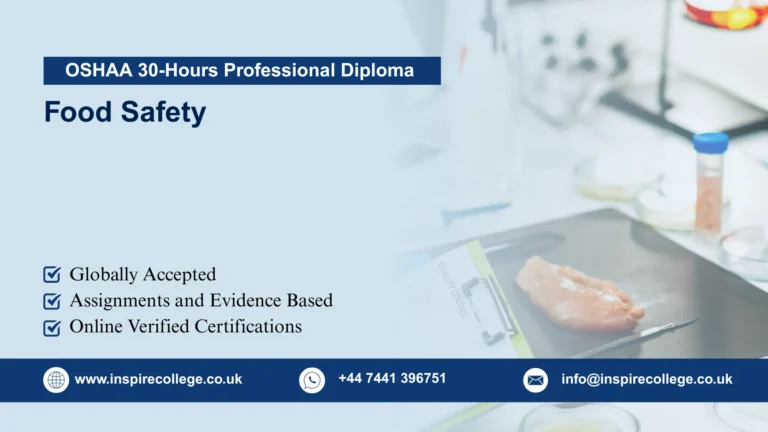
OSHAA 30-Hours Diploma in Child Psychology and Development
The early years of life are the foundation of an individual’s emotional, cognitive, and social well-being. Understanding how children grow, think, and interact is crucial for anyone involved in education, healthcare, social services, or caregiving. The OSHAA 30-Hours Diploma in Child Psychology and Development is a specialized program designed to equip learners with comprehensive knowledge of child development theories, practical psychological principles, and the tools required to support children effectively across different stages of life.
OSHAA 30-Hours Diploma in Child Psychology and Development provides a structured study of the major aspects of child psychology, including cognitive development, emotional regulation, behavioral patterns, social interaction, and language acquisition. Learners will explore the impact of family dynamics, cultural background, environment, and education on a child’s growth, while also addressing common challenges such as learning difficulties, behavioral disorders, and developmental delays. By linking theory with practice, the course ensures participants are prepared to apply child psychology knowledge in real-world contexts.
Upon completion of the program, learners will be able to recognize developmental milestones, evaluate children’s psychological needs, and apply strategies to promote healthy emotional and social development. OSHAA 30-Hours Diploma in Child Psychology and Development also develops essential skills in observation, assessment, and intervention planning, making it highly relevant for professionals working with children in both educational and clinical environments.
The OSHAA Diploma in Child Psychology and Development is particularly valuable for teachers, childcare providers, social workers, counselors, healthcare practitioners, and even parents who wish to better understand child behavior and learning processes. With an internationally recognized framework, this qualification not only enhances professional practice but also improves career opportunities in child-focused sectors worldwide.
The OSHAA 30-Hours Diploma in Child Psychology and Development is designed to be accessible to a wide range of learners, including professionals, students, and individuals with a genuine interest in understanding child growth and behavior. While the program does not require advanced academic qualifications, certain entry requirements ensure that participants are prepared to engage fully with the course content and benefit from its practical applications.
- Educational Background
- A minimum of a high school diploma, secondary school certificate, or equivalent qualification is recommended.
- Learners with backgrounds in education, psychology, health sciences, or social studies will find the course particularly beneficial, though it is open to individuals from all academic fields.
- Language Proficiency
- Since the course is delivered in English, learners should possess a good command of reading, writing, and comprehension skills.
- Non-native English speakers may be required to demonstrate proficiency to ensure they can follow academic materials and participate effectively.
- Professional or Personal Interest in Child Development
- This diploma is ideal for teachers, childcare providers, social workers, healthcare professionals, counselors, and parents who wish to strengthen their understanding of child psychology.
- Individuals planning to pursue a career in education, child care, social services, or child-focused research are highly encouraged to apply.
- Basic Computer and Internet Access
- Participants should have access to a computer, laptop, or mobile device with reliable internet connectivity, as the course may involve online resources, reading materials, or digital assessments.
- Work Experience (Optional but Advantageous)
- While prior work experience in education, childcare, or health services is not mandatory, it can enhance the learning experience by allowing learners to apply psychological theories to practical situations.
- Commitment to Guided Learning Hours
- Learners should be able to dedicate approximately 30 guided learning hours to complete the program, which includes lectures, case studies, practical exercises, and assessments.
Meeting these entry requirements ensures that participants can engage with the course material effectively, apply psychological concepts to real-world contexts, and successfully achieve certification. The OSHAA Diploma in Child Psychology and Development is designed to provide both beginners and experienced professionals with the skills and knowledge to make meaningful contributions in child-focused environments.
Mandatory Units
The OSHAA 30-Hours Diploma in Child Psychology and Development, to achieve the qualification candidates must complete all the mandatory units form the following :
Mandatory Units
- Introduction to Child Psychology and Developmental Theories
- Cognitive Development from Infancy to Adolescence
- Emotional and Social Development in Children
- Behavioural Patterns and Influencing Factors
- Language Acquisition and Communication Skills Development
- Impact of Family, School, and Social Environments on Child Development
- Identifying Developmental Delays and Special Needs
- Early Intervention and Support Strategies
- Observation, Assessment, and Record-Keeping in Child Psychology
- Ethical and Professional Practices in Working with Children
By the end of this course, learners will be able to:
Introduction to Child Psychology and Developmental Theories
- Explain the fundamental concepts, scope, and significance of child psychology, focusing on how it helps us understand the mental, emotional, and social development of children.
- Compare and contrast major developmental theories, such as Piaget’s cognitive stages, Erikson’s psychosocial model, and Vygotsky’s sociocultural approach, highlighting their practical applications in real-life settings.
- Recognise and describe the various stages of child growth and psychological development, identifying key transitions from infancy through adolescence.
Cognitive Development from Infancy to Adolescence
- Describe the stages of cognitive development, including infancy, early childhood, middle childhood, and adolescence, while identifying related developmental milestones.
- Analyse how children’s abilities in problem-solving, memory, reasoning, and learning evolve over time and vary across individuals.
- Apply developmental models to understand variations in cognitive growth and identify when a child may need additional learning support.
Emotional and Social Development in Children
- Identify the stages of emotional growth and socialisation processes that shape children’s personality and emotional well-being.
- Examine the influence of parents, peers, teachers, and caregivers on emotional stability and healthy social interactions.
- Recognise signs of emotional or social challenges, such as anxiety, isolation, or peer pressure, in different age groups.
Behavioural Patterns and Influencing Factors
- Describe common behavioural patterns observed during childhood and adolescence, including cooperation, defiance, and independence-seeking.
- Analyse the effects of genetics, environmental influences, cultural context, and life experiences on children’s behaviour.
- Identify and apply constructive strategies to address challenging behaviours, ensuring positive discipline and guidance techniques are used.
Language Acquisition and Communication Skills Development
- Explain the stages of language acquisition, from early babbling and first words to advanced communication skills in later childhood.
- Assess the role of family interaction, play-based learning, and environmental stimulation in supporting language development.
- Recognise early warning signs of speech or communication delays and understand when professional intervention may be required.
Impact of Family, School, and Social Environments on Child Development
- Analyse the role of family dynamics, parenting styles, and educational settings in shaping child development.
- Evaluate the influence of peer groups, community networks, and cultural expectations on children’s social and emotional outcomes.
- Identify effective ways to create supportive environments that encourage positive development both at home and in schools.
Identifying Developmental Delays and Special Needs
- Recognise early indicators of developmental delays across cognitive, emotional, physical, and social domains.
- Differentiate between various types of special needs, such as learning disabilities, autism spectrum disorders, and physical impairments, and understand their implications.
- Outline the procedures for referring children to professional support services and describe pathways for appropriate intervention.
Early Intervention and Support Strategies
- Explain the importance and principles of early intervention in promoting positive developmental outcomes.
- Apply practical techniques to support children with developmental challenges, behavioural difficulties, or special needs.
- Assess the effectiveness of targeted strategies and adjust interventions based on individual child progress.
Observation, Assessment, and Record-Keeping in Child Psychology
- Demonstrate systematic methods for observing children’s behaviour and documenting findings accurately.
- Apply a range of child psychology assessment tools to measure developmental progress and identify potential issues.
- Maintain detailed, ethical, and professional records in compliance with safeguarding standards and best practices.
Ethical and Professional Practices in Working with Children
- Explain the ethical responsibilities involved in working with children, including respect, fairness, and accountability.
- Apply safeguarding and child protection principles to ensure children’s rights and safety are prioritized.
- Maintain professional boundaries and uphold confidentiality when working with sensitive child-related information.
The OSHAA 30-Hours Diploma in Child Psychology and Development is designed for individuals who want to gain in-depth knowledge of children’s cognitive, emotional, and social growth. This program is ideal for professionals, caregivers, educators, and parents seeking to apply practical psychological principles to support children in educational, social, and family settings.
- Individuals seeking to build a professional understanding of child growth, behaviour, and developmental psychology.
- Early childhood educators, teaching assistants, and school staff aiming to strengthen their ability to support children’s learning and well-being.
- Childcare providers, nursery practitioners, and caregivers working in daycare, preschool, or residential settings who require deeper knowledge of developmental stages.
- Professionals in healthcare, social work, and community services who wish to broaden their expertise in child psychology and child welfare.
- Counsellors, youth workers, and family support staff engaged in welfare or intervention programmes who need practical skills to address behavioural and emotional challenges.
- Individuals considering a career change into education, childcare, psychology, or child-focused support services.
- Parents, guardians, and individuals with a personal interest in understanding children’s cognitive, emotional, and social development.
- Vocational training students or job seekers aiming to enhance their employability with a recognized child psychology and development certification.
Register Now
OSHAA 30-Hours Diploma in Child Psychology and Development






